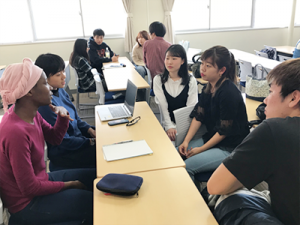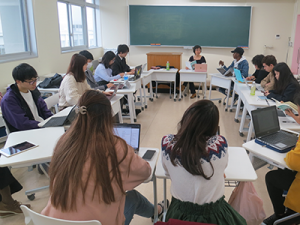
A welcome event for October entrants at a tea house in October 2018
At the Discovery Program for Global Learners at Okayama University (hereafter Discovery Program), one of the most popular courses centers on the theme of diversity. Students and faculty from different cultural, religious and educational backgrounds learn together about topics in politics, environment, health, gender and migration.
The viewpoints and attitudes necessary to live in today’s multi-faceted world
In our globalized world, it is important to adopt a tolerant attitude towards our differences in culture. Critical thinking is an essential skill to that end: Identifying problems, asking “why”, and challenging one’s beliefs helps us to understand and communicate with people from different backgrounds. One aim of the classwork at the Discovery Program is developing such skills through encouraging debates. These are based on relevant readings, and students are expected to form opinions and share these with their peers. During class, the students and teachers sit in a circle, allowing for an open atmosphere in which students find it easy to participate. Through sharing opinions with people who do not necessarily agree with them, students learn the respect necessary to become effective communicators.
Diversity and inclusiveness in contemporary Japan

A group discussion in the class
Japan, where the Discovery Program is located, provides students with a challenging case study. How does the concept of inclusiveness work in contemporary Japan? Students will be able to analyze this question through several approaches, integrating both classroom and on-site learning. Like many other countries, Japan has a long history of diversity: it is a country where diverse sets of peoples have lived. However, this fact has often been overlooked. In the present, more and more people from different backgrounds live together within the context of Japanese society. Faced with an ageing population and depopulation, developing policies to integrate these peoples will be one of the key challenges for the country in the 21st century.
Such issues are cast under a spotlight in the classes related to the theme of “Japan and Beyond,” where students have an opportunity to consider how multiculturalism can work in Japan. For example, students visit a performance by the Zainichi Korean Kumgangsan Opera Troupe. Zainichi Koreans are permanent ethnic Korean residents of Japan. Often, the performances by the troupe feature a heavy police presence and right-wing protests. Seeing this first-hand naturally leads to student discussions regarding intercultural understanding and freedom of speech.

A class by Professor Haeng-ja Chung
Professor Haeng-ja Chung, who has a wealth of experience teaching at Colorado College, Hamilton College and Smith College in the United States, discusses the importance of such first-hand experiences for students. “Our students live in a diverse society, and here they learn fundamental values of respect and compassion for each other. I expect them to take the issues we discuss in class seriously, and prepare their opinions accordingly. By engaging with a wide range of perspectives, you can understand and support each other. Through learning at the Discovery Program, I hope that my students develop true generosity towards their peers, leading them to work actively for inclusion in our society.”
Forming new perspectives on current social issues
In the “Comparative Politics” class taught by Professor Kimiko Osawa, students are asked to deepen their knowledge on current world issues. For instance, one lesson asks students to ponder the complexities of terrorist organizations based on academic readings. What is the societal and psychological context of people that enter extremist organizations? Professor Osawa prompts students with questions such as this, and students are asked to consider and form their opinions and share them with their peers.
In our age of uncertainty, it is important to be able to identify problems, and to take actions towards solving them. Students who have studied at the Discovery Problem will be equipped with practical problem-solving skills that transcend defined parameters. Combining both cross-cultural sensibilities and evaluative critical thinking will allow graduates to lead in this age of globalization.
(Witten by Maximilien Rehm and Mariko Fukui, Aalto International)

